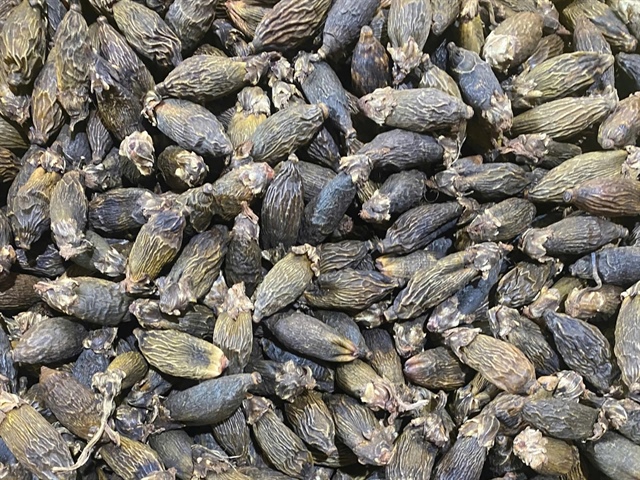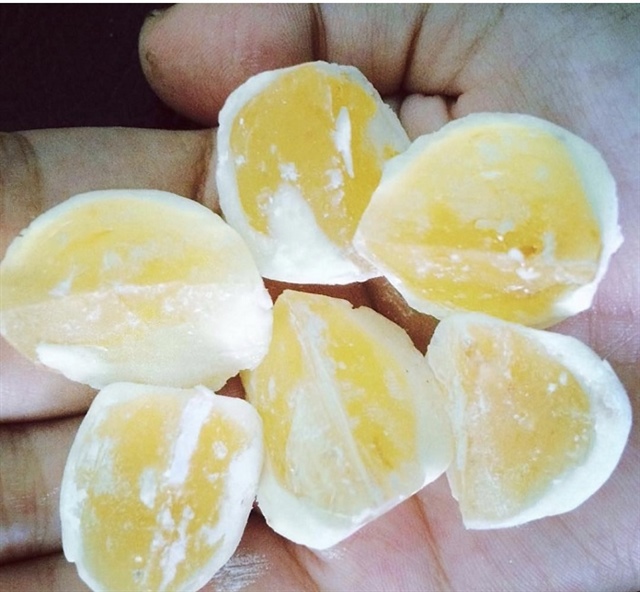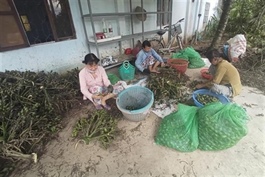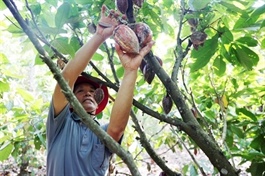Why are Chinese traders rushing to buy immature betel nuts from Vietnam?
Why are Chinese traders rushing to buy immature betel nuts from Vietnam?
Recently, Chinese traders have been aggressively purchasing immature betel nuts from Vietnam, leading to a significant price hike and questions about this unusual trend.
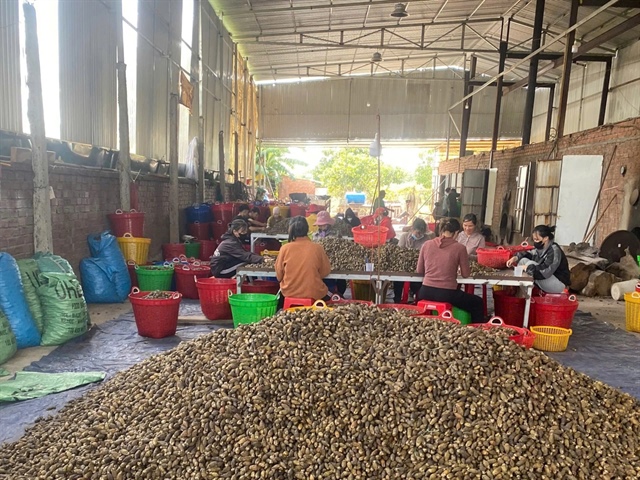
A betel nut drying facility in Dak Lak Province, Vietnam. Photo: Duong Anh |
The price of fresh immature betel nuts has soared in various regions, reaching as high as VND90,000 per kilogram (US$3.57), with rare exceptions of one tonne of betel nuts being exchanged for one tael of gold (37.5 grams).
In an interview with Tuoi Tre (Youth) newspaper, Duong Anh, manager of a betel nut drying factory in Dak Lak Province, located in the Central Highlands, explained that they buy young betel nuts, dry them, and export them to China for betel nut candy production.
On average, his factory purchases 12-13 tonnes of young betel nuts daily. The drying process yields one kilogram of dried betel nuts from 5-7 kilograms of fresh ones.
The factory produces between 2.2 and 2.3 tonnes of dried betel nuts a day, with a singular batch taking over five days to dry.
"Orders from China are pouring in, the factory is operating at full capacity, but we can't keep up with demand," Anh said.
Currently, dried betel nuts at his factory fetch VND500,000 ($20) to VND570,000 ($23) per kilogram. However, not all types of betel nuts command high prices.
Anh said that young betel nuts with small seeds and elongated fruits are the most sought after for candy production. Dwarf betel nuts, round betel nuts, and ripe betel nuts are of lesser value.
He revealed that producing a 50- to 70-gram package of betel nut candy requires about 12 dried betel nuts.
Premium candies made from fresh young betel nuts sell for approximately VND350,000 ($14) per pack, while cheaper varieties depend on the ingredients.
According to Anh, betel nut candy continues to surge in popularity across China, especially in colder regions where consumers believe it soothes sore throats and keeps the body warm.
In Vietnam, clients can find this candy at Chinese goods stores around the industrial park area in Binh Duong Province, just outside Ho Chi Minh City, which has a significant Chinese workforce.
|
|
| Freshly harvested betel nuts at a factory in Dak Lak Province, Vietnam. Photo: Duong Anh |
Reasons behind price increases
Anh attributed the recent surge in fresh betel nut prices to severe storms and floods that have damaged cultivation areas, resulting in a raw material shortage for candy production.
Conversely, regions not affected by the storms in Vietnam have maintained a stable supply and prompted Chinese traders to buy aggressively.
On social media platforms like TikTok, videos showcasing the entire betel nut process from harvest to drying have garnered thousands of views.
These clips cover the full production cycle, from purchasing and cleaning to drying and packaging for retail.
|
|
| Dried young betel nuts prepared for candy production. Photo: Duong Anh |
Taste profile of betel nut candy
TikTok also features numerous reviews highlighting the unique flavors of this candy.
One TikToker described its taste as reminiscent of cough syrup with mint and ginseng.
The candy has a hard outer shell that softens over time when chewed; as one chews more, it becomes sweeter with a slightly bitter aftertaste.
Another reviewer noted that the candy is quite hard and has a minty freshness like chewing gum, but it's not overly sweet. After chewing, it leaves a reddish-orange residue similar to betel quid.
Surveys on Vietnamese e-commerce platforms indicated that betel nut candy is typically priced at VND60,000 ($2.4) and VND200,000 ($8) per pack, depending on size and brand.
Sellers advised consumers not to swallow the pulp after chewing, with first-time users likely to experience discomfort such as heat or dizziness.
|
|
| A unique style of betel nut candy enjoyed with tea from Hue, an imperial city in Vietnam. Photo: Screenshot |
In Vietnam, betel nut candy is a well-known Hue-originating specialty but differs significantly from its Chinese counterpart.
According to the Thua Thien-Hue Province Portal, Hue's version consists of small pieces resembling split betel nuts with a hard golden-yellow interior and a white exterior made of flour and sugar.
Customers often enjoy these candies alongside tea for an enhanced flavor experience.
In addition to candies, betel nuts are processed into various dishes in China and used in traditional medicine.
As a case in point, people in Hunan Province often stir-fry duck meat with dried betel nut for added flavor, while those in Jiangxi Province may stew dried betel nut with quail or use it in congee for health benefits.


